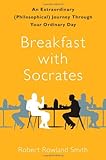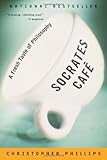|
|
Help |
| Home - Philosophers - Socrates (Books) | |
e99 Online Shopping Mall
|
|
Help |
| Home - Philosophers - Socrates (Books) | |
| 1-20 of 100 | Next 20 |
click price to see details click image to enlarge click link to go to the store
| 1. The Memorable Thoughts of Socrates by Xenophon | |
 | Paperback: 192
Pages
(2010-07-26)
list price: US$11.45 -- used & new: US$10.30 (price subject to change: see help) Asin: 1445508249 Average Customer Review: Canada | United Kingdom | Germany | France | Japan |
|
Editorial Review Product Description Customer Reviews (1)
| |
| 2. Apology, Crito and Phaedo of Socrates (Classic Reprint) by Plato Plato | |
 | Paperback: 178
Pages
(2010-04-19)
list price: US$8.12 -- used & new: US$8.12 (price subject to change: see help) Asin: 1440093121 Average Customer Review: Canada | United Kingdom | Germany | France | Japan |
|
Editorial Review Product Description Customer Reviews (1)
| |
| 3. Breakfast with Socrates: An Extraordinary (Philosophical) Journey Through Your Ordinary Day by Robert Rowland Smith | |
 | Hardcover: 256
Pages
(2010-03-09)
list price: US$18.95 -- used & new: US$3.43 (price subject to change: see help) Asin: 1439148678 Average Customer Review: Canada | United Kingdom | Germany | France | Japan |
|
Editorial Review Product Description Have breakfast with Socrates, go to work with Nietzsche, head to the gym with Foucault, then have sex with Ovid (or Simone de Beauvoir). Former Oxford Philosophy Fellow Robert Rowland Smith whisks you through an ordinary day with history's most extraordinary thinkers, explaining what they might have to say about your routine. From waking up in the morning through traveling to work, shopping, eating, going to a party, falling asleep, and dreaming, Smith connects our most mundane habits to the wider world of ideas. Start with waking up: What does it really mean to be awake? How do we know we're not still dreaming? Descartes argues that if you're able to doubt whether you're awake, you are at least thinking, and so you probably exist -- no small achievement for first thing in the morning. Or take going to the gym: As you toil on the treadmill, is your panting a sign of virtue or of vice, of healthy exertion or of unhealthy narcissism? Working out is a version of what Max Weber called the Protestant work ethic -- a kind of spiritual exercise, it also leads to worldly vanity. With dry wit and marvelous invention, Smith draws on philosophy, literature, art, politics, and psychology to wake us up to a stunning range of ideas about how to live. Neither breakfast, lunch, nor dinner will ever be the same again. Customer Reviews (3)
| |
| 4. The Last Days of Socrates by Plato | |
 | Paperback: 168
Pages
(2010-05-06)
list price: US$12.00 -- used & new: US$10.80 (price subject to change: see help) Asin: 1452847096 Average Customer Review: Canada | United Kingdom | Germany | France | Japan |
|
Editorial Review Product Description Customer Reviews (12)
| |
| 5. The Journeys of Socrates: An Adventure by Dan Millman | |
 | Paperback: 352
Pages
(2006-03-01)
list price: US$14.99 -- used & new: US$8.54 (price subject to change: see help) Asin: 0060833025 Average Customer Review: Canada | United Kingdom | Germany | France | Japan |
|
Editorial Review Product Description The Way Begins . . . Sergei was three when the soldiers took him. At fifteen he fled into the wilderness, with nothing to cling to but the memories of a grandfather who called him Socrates and the promise of a gift buried near St. Petersburg. Thus begins The Journeys of Socrates -- an odyssey that forged the character of Sergei Ivanov, whose story would one day change the lives of millions of readers worldwide. This saga of courage and faith, of love and loss, reveals the arts of war and the path to peace. Ultimately, it speaks to the quest we all share for a meaningful life in a challenging world. Customer Reviews (66)
| |
| 6. The Trial and Death of Socrates by Plato | |
 | Hardcover: 128
Pages
(2010-07-01)
list price: US$8.99 -- used & new: US$6.51 (price subject to change: see help) Asin: 0785826173 Average Customer Review: Canada | United Kingdom | Germany | France | Japan |
|
Editorial Review Product Description Customer Reviews (15)
| |
| 7. Conversations of Socrates (Penguin Classics) by Xenophon | |
 | Paperback: 384
Pages
(1990-07-03)
list price: US$14.00 -- used & new: US$7.92 (price subject to change: see help) Asin: 014044517X Average Customer Review: Canada | United Kingdom | Germany | France | Japan |
|
Editorial Review Product Description Customer Reviews (14)
| |
| 8. The Unaborted Socrates: A Dramatic Debate on the Issues Surrounding Abortion by Peter Kreeft | |
 | Paperback: 155
Pages
(1983-07-13)
list price: US$15.00 -- used & new: US$7.50 (price subject to change: see help) Asin: 0877848106 Average Customer Review: Canada | United Kingdom | Germany | France | Japan |
|
Editorial Review Product Description Customer Reviews (26)
| |
| 9. Socrates' Way: Seven Keys to Using Your Mind to the Utmost by Ronald Gross | |
 | Paperback: 304
Pages
(2002-10-14)
list price: US$18.95 -- used & new: US$10.95 (price subject to change: see help) Asin: 1585421928 Average Customer Review: Canada | United Kingdom | Germany | France | Japan |
|
Editorial Review Product Description Customer Reviews (22)
| |
| 10. From Socrates to Sartre: The Philosophic Quest by T.Z. Lavine | |
 | Paperback: 448
Pages
(1985-02-01)
list price: US$7.99 -- used & new: US$3.95 (price subject to change: see help) Asin: 0553251619 Average Customer Review: Canada | United Kingdom | Germany | France | Japan |
|
Editorial Review Product Description Customer Reviews (25)
| |
| 11. Four Texts on Socrates: Plato's Euthyphro, Apology, and Crito and Aristophanes' Clouds by Thomas G. West, Grace Starry West | |
 | Paperback: 190
Pages
(1998-10)
list price: US$11.95 -- used & new: US$6.25 (price subject to change: see help) Asin: 0801485746 Average Customer Review: Canada | United Kingdom | Germany | France | Japan |
|
Editorial Review Product Description Thomas G. West's introduction provides an overview of the principal themes and arguments of the four works. There are extensive explanatory notes to the translations. For this new edition, Thomas West has revised the introduction and updated the annotated bibliography, which includes the best of the secondary literature on Socrates and on the texts included in this book. In their translations, the Wests capture successfully the simplicity and vigor of straightforward Greek diction. They strive for as high a degree of accuracy as possible, subordinating concerns for elegance and smoothness to the goal of producing the most faithful and most reliable English versions of these texts. Customer Reviews (8)
| |
| 12. The Trial and Death of Socrates: Four Dialogues (Dover Thrift Editions) by Plato | |
| Paperback: 128
Pages
(1992-02-05)
list price: US$2.50 -- used & new: US$0.15 (price subject to change: see help) Asin: 0486270661 Average Customer Review: Canada | United Kingdom | Germany | France | Japan | |
|
Editorial Review Product Description Customer Reviews (13)
| |
| 13. Socrates Cafe: A Fresh Taste of Philosophy by Christopher Phillips | |
 | Paperback: 256
Pages
(2002-04-17)
list price: US$13.95 -- used & new: US$5.60 (price subject to change: see help) Asin: 039332298X Average Customer Review: Canada | United Kingdom | Germany | France | Japan |
|
Editorial Review Product Description Phillips seizes upon what the Greeks called "elenchus," a method of inquiry that helps people see their own beliefs and opinions more clearly. In the course of the numerous Socrates cafés highlighted in this book, Phillips persistently reminds us that we ought to ask questions simply because the process is good for us. In each of the cafés, the participants vary as widely as the questions, and the dialogues are by turns candid, insightful, muddled, intelligent, bland, and piquant. The real meaning of Socrates Café lies in the contentious and wonderful space of human interaction. --Eric de Place Customer Reviews (44)
| |
| 14. The Trial of Socrates by I.F. Stone | |
 | Paperback: 304
Pages
(1989-02-27)
list price: US$16.00 -- used & new: US$3.04 (price subject to change: see help) Asin: 0385260326 Average Customer Review: Canada | United Kingdom | Germany | France | Japan |
|
Editorial Review Product Description Customer Reviews (38)
| |
| 15. Philosophy 101 by Socrates: An Introduction to Philosophy Via Plato's Apology by Peter Kreeft | |
 | Paperback: 100
Pages
(2002-10)
list price: US$11.95 -- used & new: US$6.44 (price subject to change: see help) Asin: 0898709253 Average Customer Review: Canada | United Kingdom | Germany | France | Japan |
|
Editorial Review Product Description Customer Reviews (7)
| |
| 16. Before and after Socrates by F. M. Cornford | |
 | Paperback: 124
Pages
(1932-01-03)
list price: US$28.99 -- used & new: US$18.25 (price subject to change: see help) Asin: 0521091136 Average Customer Review: Canada | United Kingdom | Germany | France | Japan |
|
Editorial Review Product Description Customer Reviews (9)
| |
| 17. The Last Days of Socrates: Euthyphro; The Apology; Crito; Phaedo (Penguin Classics) by Plato | |
 | Paperback: 272
Pages
(1993-12-01)
list price: US$11.95 -- used & new: US$11.94 (price subject to change: see help) Asin: 014044582X Average Customer Review: Canada | United Kingdom | Germany | France | Japan |
|
Editorial Review Product Description Customer Reviews (11)
| |
| 18. Socrates Meets Jesus: History's Greatest Questioner Confronts the Claims of Christ by Peter Kreeft | |
 | Paperback: 182
Pages
(2002-01-10)
list price: US$15.00 -- used & new: US$8.55 (price subject to change: see help) Asin: 0830823387 Average Customer Review: Canada | United Kingdom | Germany | France | Japan |
|
Editorial Review Product Description Customer Reviews (27)
| |
| 19. Socrates: A Life Examined by Luis E. Navia | |
 | Hardcover: 291
Pages
(2007-03-14)
list price: US$28.98 -- used & new: US$15.71 (price subject to change: see help) Asin: 159102501X Average Customer Review: Canada | United Kingdom | Germany | France | Japan |
|
Editorial Review Product Description Philosopher Luis E. Navia presents a compelling portrayal of Socrates in this very readable and well-researched book, which is both a biography of the man and an exploration of his ideas. Through a critical and documented study of the major ancient sources about Socrates--in the writings of Aristophanes, Xenophon, Plato, and Aristotle--Navia reconstructs a surprisingly consistent portrait of this enigmatic philosopher. He links Socrates' conviction that the unexamined life is not worth living with Immanuel Kant's later concept of an innate moral imperative as the only meaningful purpose of human existence. He highlights Socrates' unrelenting search for the essence and value of the soul as that aspect of his philosophical journey that animated and structured all his activities. Navia also considers Socrates' relationship with the Sophists, his stance vis-à-vis the religious beliefs and practices of his time, his view of the relationship between legality and morality, and the function of language in human life. Finally, he eloquently captures the Socratic legacy, which, more than twenty-four centuries after his death, is still so urgently relevant today. Navia brings to life this perennially important philosopher, illuminating the relevance of his ideas for our modern world. Customer Reviews (5)
| |
| 20. Why Socrates Died: Dispelling the Myths by Robin Waterfield | |
 | Hardcover: 288
Pages
(2009-06-08)
list price: US$27.95 -- used & new: US$12.00 (price subject to change: see help) Asin: 0393065278 Average Customer Review: Canada | United Kingdom | Germany | France | Japan |
|
Editorial Review Product Description Customer Reviews (6)
| |
| 1-20 of 100 | Next 20 |